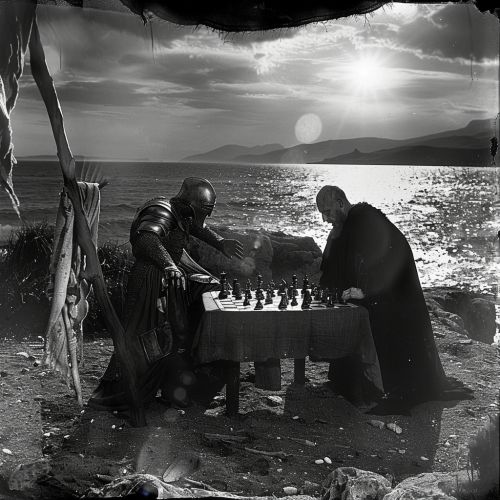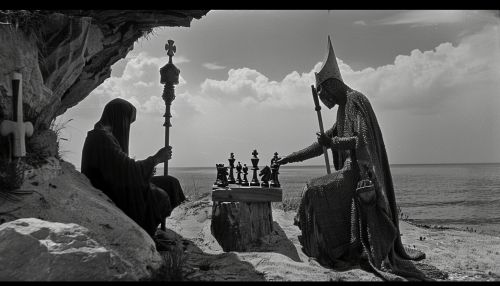Ingmar Bergman
Early Life and Education
Ernst Ingmar Bergman was born on July 14, 1918, in Uppsala, Sweden. He was the son of Erik Bergman, a Lutheran minister, and Karin Åkerblom, a nurse. Bergman's upbringing was deeply influenced by his father's strict religious beliefs and his mother's emotional distance. This environment would later be reflected in the themes of his films, which often explored complex relationships and existential questions.
Bergman attended Stockholm University College, where he initially studied art and literature. However, his interest soon shifted to theater and film. He began his career in the arts by working as a script editor for the Swedish film studio Svensk Filmindustri (SF) in the early 1940s. His early exposure to the film industry provided him with the technical skills and creative insights that would shape his future works.
Career Beginnings
Bergman's directorial debut came in 1946 with the film "Crisis" (Kris). Although the film did not achieve significant commercial success, it marked the beginning of Bergman's prolific career. His early works, such as "Port of Call" (1948) and "Thirst" (1949), began to establish his reputation as a filmmaker who delved into the psychological and emotional depths of his characters.
In 1951, Bergman directed "Summer Interlude" (Sommarlek), a film that is often considered a turning point in his career. The film's exploration of memory, loss, and the passage of time showcased Bergman's growing mastery of cinematic storytelling. This period also saw Bergman collaborating with cinematographer Sven Nykvist, who would become a crucial partner in many of his later films.
Major Works and Themes
The Seventh Seal
One of Bergman's most iconic films, "The Seventh Seal" (Det sjunde inseglet), was released in 1957. The film is set during the Black Death and follows a knight, played by Max von Sydow, who engages in a game of chess with Death. The film's exploration of existential themes, such as the search for meaning and the inevitability of death, resonated deeply with audiences and critics alike. "The Seventh Seal" is often cited as a masterpiece of world cinema.


Wild Strawberries
In the same year, Bergman released "Wild Strawberries" (Smultronstället), a film that further solidified his reputation as a master filmmaker. The film follows an elderly professor, played by Victor Sjöström, as he embarks on a road trip to receive an honorary degree. Through a series of flashbacks and dream sequences, the film delves into themes of memory, regret, and reconciliation. "Wild Strawberries" is notable for its introspective narrative and innovative use of non-linear storytelling.
Persona
Released in 1966, "Persona" is often regarded as one of Bergman's most challenging and enigmatic films. The film stars Liv Ullmann and Bibi Andersson as a nurse and a mute actress who develop a complex and intense relationship. "Persona" is renowned for its experimental narrative structure, psychological depth, and striking visual composition. The film's exploration of identity, duality, and the nature of reality has made it a subject of extensive academic analysis.
Later Career and Legacy
Fanny and Alexander
In 1982, Bergman released "Fanny and Alexander" (Fanny och Alexander), a film that many consider his magnum opus. The film, which was originally conceived as a television miniseries, is a semi-autobiographical account of Bergman's own childhood. "Fanny and Alexander" is notable for its rich character development, intricate storytelling, and lavish production design. The film won four Academy Awards, including Best Foreign Language Film, and is often cited as one of the greatest films ever made.
Influence and Recognition
Bergman's influence on cinema is profound and far-reaching. His work has inspired countless filmmakers, including Woody Allen, Martin Scorsese, and Andrei Tarkovsky. Bergman's films are characterized by their deep psychological insight, complex characterizations, and exploration of existential themes. His contributions to the art of filmmaking have been recognized with numerous awards and honors, including the Palme d'Or at the Cannes Film Festival and the Irving G. Thalberg Memorial Award from the Academy of Motion Picture Arts and Sciences.
Personal Life
Bergman's personal life was as complex and multifaceted as his films. He was married five times and had nine children. His relationships with his wives and children were often tumultuous, and his work frequently reflected his personal struggles and emotional turmoil. Despite his fame and success, Bergman was known for his reclusive nature and intense dedication to his craft.
Death and Posthumous Recognition
Ingmar Bergman passed away on July 30, 2007, at the age of 89. His death marked the end of an era in world cinema, but his legacy continues to live on through his films. Bergman's work remains a subject of study and admiration for film scholars, critics, and enthusiasts. Retrospectives of his films are regularly held at film festivals and cinematheques around the world, ensuring that his contributions to cinema are remembered and celebrated.
